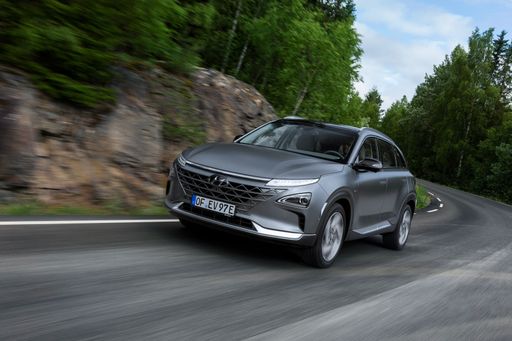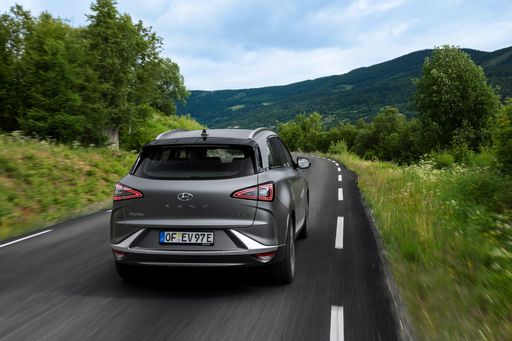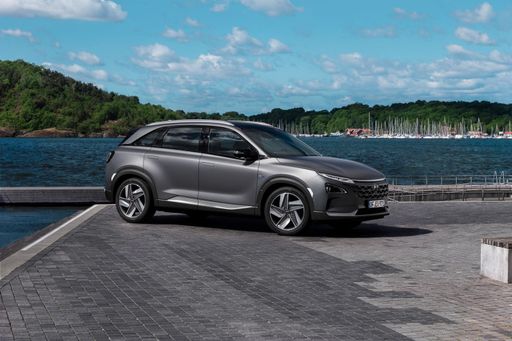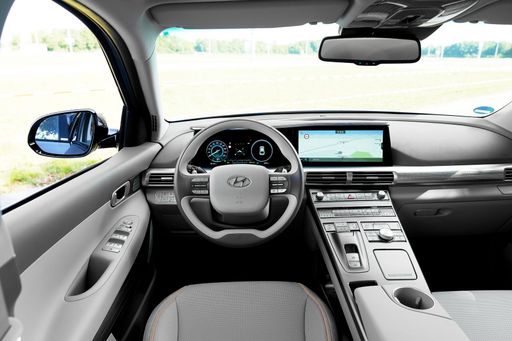Hyundai Nexo VS Renault Master Transporter – Specs, Efficiency & Price Comparison
Which model is the better choice – the Hyundai Nexo or the Renault Master Transporter? We compare performance (163 HP vs 170 HP), boot capacity (461 L vs ), efficiency ( vs 25.10 kWh7.40 L), and of course, the price (66400 £ vs 36000 £).
Find out now which car fits your needs better!
The Hyundai Nexo (SUV) is powered by a Hydrogen engine and comes with a Automatic transmission. In comparison, the Renault Master Transporter (Cargo Van) features a Diesel or Electric engine and a Manuel or Automatic gearbox.
When it comes to boot capacity, the Hyundai Nexo offers 461 L, while the Renault Master Transporter provides – depending on what matters most to you. If you’re looking for more power, you’ll need to decide whether the 163 HP of the Hyundai Nexo or the 170 HP of the Renault Master Transporter suits your needs better.
There are also differences in efficiency: vs 25.10 kWh7.40 L. In terms of price, the Hyundai Nexo starts at 66400 £, while the Renault Master Transporter is available from 36000 £.
Compare all the key specs now and find out which model fits your lifestyle best!
Hyundai Nexo
The Hyundai Nexo stands out in the automotive world as a pioneering hydrogen fuel cell vehicle, offering an eco-friendly alternative to conventional engines. Its sleek design combines modern aesthetics with advanced technology, providing a comfortable and futuristic driving experience. The Nexo not only represents a significant step towards sustainable motoring but also impresses with its smooth and silent performance on the road.
details @ hyundai.news
@ hyundai.news
 @ hyundai.news
@ hyundai.news
 @ hyundai.news
@ hyundai.news
 @ hyundai.news
@ hyundai.news
Renault Master Transporter
The Renault Master Transporter is a versatile and robust vehicle tailored for a variety of commercial needs. With its spacious interior and ergonomic design, it offers both comfort and efficiency for long hauls. Its reliable performance and modern features make it a popular choice among businesses looking for a dependable transport solution.
details

|
|
|
|
|
Costs and Consumption |
|
|---|---|
|
Price
66400 - 71000 £
|
Price
36000 - 53800 £
|
|
Consumption L/100km
-
|
Consumption L/100km
7.4 - 7.5 L
|
|
Consumption kWh/100km
-
|
Consumption kWh/100km
25.1 - 25.3 kWh
|
|
Electric Range
666 km
|
Electric Range
406 - 409 km
|
|
Battery Capacity
-
|
Battery Capacity
-
|
|
co2
0 g/km
|
co2
0 - 198 g/km
|
|
Fuel tank capacity
6 L
|
Fuel tank capacity
80 L
|
Dimensions and Body |
|
|---|---|
|
Body Type
SUV
|
Body Type
Cargo Van
|
|
Seats
5
|
Seats
3
|
|
Doors
5
|
Doors
4
|
|
Curb weight
1889 kg
|
Curb weight
2128 - 2459 kg
|
|
Trunk capacity
461 L
|
Trunk capacity
-
|
|
Length
4670 mm
|
Length
5685 - 6315 mm
|
|
Width
1860 mm
|
Width
2080 mm
|
|
Height
1630 mm
|
Height
2498 mm
|
|
Payload
451 kg
|
Payload
1041 - 1859 kg
|
Engine and Performance |
|
|---|---|
|
Engine Type
Hydrogen
|
Engine Type
Diesel, Electric
|
|
Transmission
Automatic
|
Transmission
Manuel, Automatic
|
|
Transmission Detail
Reduction Gearbox
|
Transmission Detail
Schaltgetriebe
|
|
Drive Type
Front-Wheel Drive
|
Drive Type
Front-Wheel Drive
|
|
Power HP
163 HP
|
Power HP
105 - 170 HP
|
|
Acceleration 0-100km/h
9.2 - 9.5 s
|
Acceleration 0-100km/h
13.50 s
|
|
Max Speed
177 - 179 km/h
|
Max Speed
90 - 175 km/h
|
|
Torque
395 Nm
|
Torque
300 - 380 Nm
|
|
Number of Cylinders
-
|
Number of Cylinders
4
|
|
Power kW
120 kW
|
Power kW
77 - 125 kW
|
|
Engine capacity
-
|
Engine capacity
1997 cm3
|
General |
|
|---|---|
|
Model Year
2018 - 2021
|
Model Year
2024
|
|
CO2 Efficiency Class
A
|
CO2 Efficiency Class
G, A
|
|
Brand
Hyundai
|
Brand
Renault
|
Hyundai Nexo
Introducing the Hyundai Nexo: A Step into the Future of Automobiles
The Hyundai Nexo represents a groundbreaking stride in the realm of hydrogen-powered vehicles, aligning cutting-edge technology with environmental sustainability. As an SUV, it offers an impressive blend of performance, efficiency, and style, challenging the conventional norms of automotive engineering.
Advanced Hydrogen Technology
At the heart of the Hyundai Nexo's innovation is its hydrogen fuel cell powertrain, a marvel that enables the vehicle to achieve zero CO2 emissions, boasting a remarkable CO2-Effizienzklasse of A. This SUV offers the dual advantages of an eco-friendly footprint with the substantial performance of a traditional combustion engine.
Impressive Performance Metrics
Equipped with a robust 120 kW (163 PS) motor, the Nexo can accelerate from 0 to 100 km/h in a commendable span of 9.2 to 9.5 seconds. This makes the Nexo not just a green choice but also a viable option for those who value brisk acceleration and dynamic driving capabilities. Furthermore, the vehicle manages a top speed of 177 to 179 km/h, showcasing its ability to hold its own on motorways.
Efficient Design and Spacious Comfort
The Nexo’s dimensions, at 4670 mm in length, 1860 mm in width, and 1630 mm in height, underline its role as a spacious and practical SUV. Inside, it comfortably seats up to five occupants, ensuring a luxurious ride experience complemented by its 461-litre boot capacity, ideal for both daily commutes and longer journeys.
State-of-the-Art Features
Hyundai's commitment to excellence is evident in the Nexo’s suite of advanced features. The Prime-Paket trim offers sophistication and practicality, integrating seamless technology with high-quality materials that redefine interior comfort and style. Despite its avant-garde hydrogen technology, Hyundai hasn't compromised on the intuitive user experience.
Cost and Efficiency Analysis
With monthly running costs between €1680 and €1786 and variable costs per kilometre from 67.2 to 71.5 cents, the Hyundai Nexo is an investment in future-oriented automotive excellence. Its distinctive lack of CO2 emissions assures potential owners of its sustainability, while its running costs reflect the premium nature of its innovative technology.
Conclusion: The Future is Hydrogen
The Hyundai Nexo serves as a testament to the potential of hydrogen as a mainstream fuel source. By offering leading-edge technology, notable performance, and unbeatable efficiency, the Nexo positions itself as a beacon of future mobility. For those ready to embrace the next chapter of automotive evolution, the Nexo awaits as a stellar option.
Renault Master Transporter
Discover the Capabilities of the Renault Master Transporter
The Renault Master Transporter has long established itself as a leading choice for businesses in need of a reliable and versatile vehicle. With a robust build, innovative features, and a range of engine options, the Master Transporter is designed to meet diverse transportation needs. Whether you’re looking to transport goods or people, this model offers remarkable adaptability.
Power and Performance Under the Bonnet
At the heart of the Renault Master lies an array of powerful diesel engines, ranging from 105 to 180 PS. These engines are not only built to deliver strength but also efficiency, with fuel consumption figures as low as 7.4 L/100km. The Master Transporter manages to strike the delicate balance between performance and economy, making it a practical option for long-distance logistics.
Versatility in Design and Functionality
The Renault Master comes in various configurations to suit specific business needs. With body lengths ranging from 5575 mm to 6875 mm and heights between 2488 mm and 2808 mm, there’s a version for every requirement. The load capacity is impressively versatile, supporting between 873 kg to over 2 tonnes, ensuring that heavy or bulkier items are easily accommodated.
Innovative Features and Technology
Renault has equipped the Master Transporter with advanced technology to enhance the driving experience. The cabin is designed with the driver in mind, featuring ergonomic seating, a user-friendly dashboard, and optional extras such as a touchscreen infotainment system. For added driving efficiency, the Master also includes features like cruise control and rear parking sensors.
Environmental Considerations
While diesel engines are sometimes scrutinized for their environmental impact, Renault has taken steps to ensure that their engines are as clean as possible. The Master Transporter boasts CO2 emissions ranging from 195g/km to 359g/km. Renault's commitment to reducing its carbon footprint is evident in the vehicle's efficient fuel combustion technologies.
Conclusion: The Ideal Business Partner
The Renault Master Transporter is an ideal choice for any business requiring a reliable and cost-effective vehicle. Its combination of power, versatility, and innovative features makes it a valuable asset for daily operations, whether for transporting goods or providing transportation services. With a model range that caters to a variety of specifications, the Renault Master continues to dominate its class.
The prices and data displayed are estimates based on German list prices and may vary by country. This information is not legally binding.
